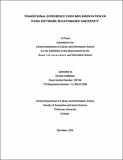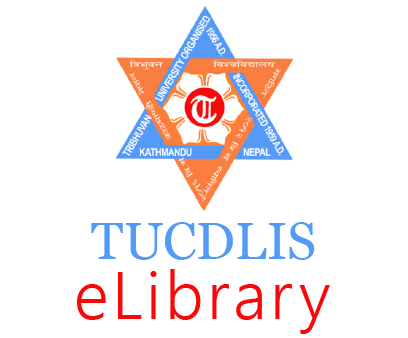Please use this identifier to cite or link to this item:
http://elibrary.tucdlis.edu.np/handle/20.500.12902/331Full metadata record
| DC Field | Value | Language |
|---|---|---|
| dc.contributor.author | Gurung, Elina | - |
| dc.date.accessioned | 2024-03-13T04:49:40Z | - |
| dc.date.available | 2024-03-13T04:49:40Z | - |
| dc.date.issued | 2023-12-22 | - |
| dc.identifier.citation | Gurung ,Elina (2023).Transitional experience over implementation of KOHA software in Kathmandu University .[Master' Thesis, Tribhuvan University ].TUCDLIS elibrary.Tucdlis elibrary.https:// elibrary / | en_US |
| dc.identifier.uri | http://elibrary.tucdlis.edu.np/handle/20.500.12902/331 | - |
| dc.description.abstract | This thesis entitled "Transitional Experience over Implementation of KOHA software in Kathmandu University” focuses on the challenges and barriers faced by Kathmandu University (KU) school libraries in transitioning from SOUL 2.0 software to KOHA. The research was conducted across six distinct libraries affiliated with various schools within Kathmandu University to ensure comprehensive data coverage. The transition from SOUL 2.0 to KOHA at Kathmandu University's library brought challenges in data migration, staff training, and user education. The study focused on users' perceptions before and after KOHA installation, examining information access, system effectiveness, and user interface. The goal was to provide insights for addressing issues, improving system functionality, and enhancing the overall library experience by analyzing user experiences and barriers related to KOHA at Kathmandu University. The research compared user experiences with KOHA Software to SOUL 2.0 at Kathmandu University libraries, identified challenges during KOHA implementation, and explored user satisfaction and influencing factors. It employed a mixed-methods approach, utilizing qualitative methods such as interviews, surveys, and focus groups to explore user experiences and perspectives during the transition. The study also delved into quantitative data through surveys to analyze user satisfaction, ease of use, and overall perceptions, allowing for statistical analysis using MS Excel for broader insights within the user population. The research reveals a robust 92% user preference for transitioning to KOHA, signaling positive impact. The Online Public Access Catalog (OPAC) is a standout feature, positively acknowledged by 52% of users, enhancing the overall experience. These insights inform academic library management, highlighting appreciated KOHA attributes. The study emphasizes a shortage of skilled staff, urging resource allocation and skill development to ensure seamless library operations amid evolving technology. | en_US |
| dc.description.sponsorship | No Sponsor | en_US |
| dc.language.iso | en | en_US |
| dc.publisher | Central Department of library and information science | en_US |
| dc.subject | Digital Libraries | en_US |
| dc.subject | Digital Preservation | en_US |
| dc.title | Transitional experience over implementation of KOHA software in Kathmandu University . | en_US |
| dc.type | Thesis | en_US |
| Appears in Collections: | submission of 2023 A.D. | |
Files in This Item:
| File | Description | Size | Format | |
|---|---|---|---|---|
| New Final Final Thesis_Elina Grg.pdf | 5.09 MB | Adobe PDF |  View/Open |
Items in DSpace are protected by copyright, with all rights reserved, unless otherwise indicated.
